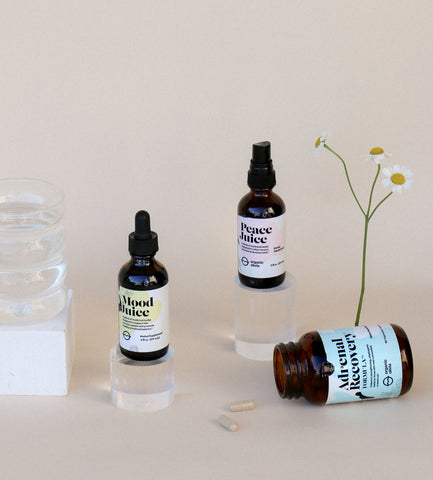Have you ever found yourself unbuttoning your pants after a meal because your belly feels like it's about to burst? Or felt so bloated that you couldn't bear the thought of putting on anything but your loosest clothes? If this sounds familiar, you're definitely not alone.
Bloating affects millions of people, and it can be one of the most frustrating digestive symptoms to deal with day after day. I've worked with countless people who tell me they feel embarrassed by the gas, uncomfortable in their own skin, and exhausted from trying to figure out what's causing their digestive distress. Many wonder, "Do probiotics help with bloating?" The answer isn't always straightforward, but research suggests that the right probiotics can indeed provide relief.
Here's what many people don't realize: the relationship between probiotics and bloating isn't always simple. While beneficial bacteria can provide incredible relief for many people, some individuals actually experience temporary bloating when they first start taking probiotics. This happens because your gut needs time to adjust to these new bacterial populations.
The good news? Research shows that people who take probiotics can improve their bowel regularity by 10% to 15%, which often translates to bloating relief over time. In fact, certain strains like Lactobacillus and Bifidobacterium have shown particular promise for reducing bloating and supporting overall gut health. Probiotics for gas and bloating have become increasingly popular as more people seek natural solutions for digestive discomfort.
So if you're tired of feeling uncomfortable in your own body, this guide will help you understand what's really causing your bloating, how probiotics can help restore balance in your gut, and which specific strains might work best for your unique situation. You don't have to accept bloating as just part of life. There are real solutions that can help you feel comfortable and confident again.
What's Really Behind Your Chronic Bloating?
Bloating happens when your abdomen feels full, distended, or tight, often accompanied by embarrassing gas. The key to lasting relief isn't just managing symptoms; it's understanding what's causing them in the first place. This is where probiotics for gut health and bloating can make a significant difference. But before you can fix the problem, it helps to know what’s quietly sabotaging your digestion day after day.
Hidden Daily Habits That Trigger Bloating
You might be surprised to learn that some of your everyday habits could be setting you up for digestive discomfort. Eating too quickly tops the list — when you rush through meals, you swallow excess air that gets trapped in your digestive system. Your gut simply can't keep up with the pace.
Distracted eating creates another problem. Scrolling through your phone or watching TV while eating disrupts the digestive signals between your brain and gut. Your body needs to be in "rest and digest" mode to properly break down food.
Your food choices matter more than you might think. Foods high in certain carbohydrates, particularly FODMAPs, ferment in your gut and create gas. The biggest culprits include:
-
Beans, lentils, and legumes
-
Certain fruits like apples and pears
-
Vegetables such as onions, garlic, and broccoli
-
Carbonated beverages
-
Sugar alcohols in sugar-free products
Even drinking large amounts of water during meals can backfire. This dilutes your stomach acid, which you need to break down food properly. Understanding these triggers can help you make informed choices about when to use probiotics for gas and which dietary changes might complement your probiotic regimen.
9 Warning Signs Your Digestion Needs Help
Your body sends clear messages when your digestive system is struggling. Look for these telltale signs:
-
Frequent gas and bloating after meals
-
Constipation — when stool sits too long in your colon, bacteria ferment it and produce more gas
-
Food intolerances that seem to be getting worse over time
-
Excessive burping, which can signal poor stomach emptying
-
Feeling full quickly during meals
-
Abdominal discomfort that comes and goes
-
Irregular bowel movements — either too loose or too hard
-
Skin issues that flare up after eating certain foods
-
Fatigue after meals instead of feeling energized
If you're checking off several of these signs, it's time to take your gut health seriously. A high-quality probiotic, paired with smarter habits, can help rebalance your microbiome and bring lasting relief.
Plus, did you know that 20% of people deal with food intolerances that contribute to bloating. Lactose intolerance is particularly common. This is when your body stops producing enough lactase enzyme to break down milk sugar, leading to gas and bloating. In these cases, a probiotic supplement specifically designed for gas relief can be particularly helpful.
How Probiotics Work in Your Gut
Think of your gut as a bustling city with trillions of residents. Just like any thriving community, when the good citizens outnumber the troublemakers, everything runs smoothly. But when harmful bacteria start taking over the neighborhood, problems arise, bloating, gas, and digestive discomfort become the norm.
Probiotics work by sending in reinforcements of beneficial bacteria to restore order in your gut city. These microscopic allies don't just sit quietly — they actively compete with harmful bacteria for space and resources, essentially crowding out the troublemakers. This is why probiotics for gut health and bloating can be so effective: they help restore balance to your entire digestive ecosystem.
What Makes Probiotics Effective
For probiotics to actually help with your bloating, they need to survive quite a journey. First, they must make it through your stomach's acidic environment — think of it as passing through a harsh security checkpoint. Then, they need to reach your intestines in sufficient numbers to make a real difference.
Your gut microbiome affects far more than just digestion. It influences your immune system, mood, and even how well you absorb nutrients from food. Some probiotics may even help with vitamin B12 absorption, which is crucial for energy and nerve function. Unfortunately, everyday factors like stress, poor diet choices, and antibiotics can throw this delicate ecosystem out of balance. But even once probiotics reach your gut and start doing their job, you might notice some unexpected changes, like bloating and gas at first.
The Gut-Immune Connection
While temporary bloating might seem like a small inconvenience, what’s happening in your gut has far-reaching effects on your entire body, including your immune system.
Nearly 80% of your immune system lives in your gut, which explains why gut health problems often come with other health issues. Probiotics interact directly with your immune cells, helping to strengthen your body's natural defenses.
Probiotics also help repair your intestinal barrier — the protective lining that keeps harmful substances from leaking into your bloodstream. When this barrier becomes compromised (often called leaky gut), it can trigger inflammation throughout your body and worsen digestive symptoms.
Different probiotic strains offer unique benefits. Lactobacillus acidophilus supports general digestive function, while Bifidobacterium species can be particularly helpful for people dealing with irregular bowel movements that contribute to bloating. Some strains, like those found in Not Your Average Probiotic, are specifically formulated for bloating relief and improved food digestion.

Not Your Average Probiotic
An advanced prebiotic, probiotic, enzyme blend designed to support gut microbiome diversity, skin health, digestion and elimination.*
STAR HERB: Lactobacillus rhamnosus GG.
Beyond immediate symptom relief, probiotics produce short-chain fatty acids that nourish your intestinal cells and reduce inflammation. This is why many people notice improvements in other areas of their health — clearer skin, better mood, more energy — when they support their gut with the right probiotics.
The key is finding the right strains and dosages for your unique gut ecosystem. What works for one person may not work for another, which is why targeted formulations designed specifically for bloating relief can make such a difference.
For those dealing with both bloating and weight concerns, some strains offer dual benefits. Lactobacillus gasseri, found in the probiotic I created, has shown promising effects on weight loss while helping with digestive comfort. A combination of Lactobacillus curvatus and Lactobacillus plantarum strains demonstrated reductions in body weight, visceral fat mass, and waist circumference.
The key is understanding that different strains do different things. This isn't a "one-size-fits-all" situation. The best probiotic for gas and bloating will contain clinically studied strains at effective doses.
What to Look for in a Quality Probiotic
Quality matters tremendously when it comes to probiotics. Many products don't deliver what's promised on the label. Here's what you need to know:
Colony-forming units (CFUs) matter, but more isn't always better. Look for probiotics with 1 billion to 10 billion CFU as a minimum effective daily dose. For general gut health, at least 25 billion CFU is recommended, while those with irritable bowel syndrome may benefit from 100 billion CFU.
Other important factors include:
-
Storage requirements: Some formulations need refrigeration while others remain stable at room temperature
-
Expiration dates: Check that the product won't expire before you finish it, as CFU counts decrease over time
-
Delivery format: Capsules, powders, and liquids offer different advantages depending on your preferences
The Adjustment Period: What's Normal and When to Worry
Here's something that surprises many people: probiotics may temporarily increase bloating when you first start taking them. This isn't a sign that they're not working — it's actually your gut microbiome adjusting to the new bacterial populations.
These initial side effects typically subside within a few weeks as your digestive system adapts. I always tell my patients to expect this adjustment period rather than panic when it happens. This is a common experience when using probiotics for gas and bloating.
To minimize these temporary effects:
-
Start with a lower dose and gradually increase to the full dosage
-
Take probiotics with food to help neutralize stomach acid
-
Maintain consistent daily use rather than sporadic consumption
If bloating persists beyond several weeks, consider switching to a different strain or formulation. Your gut microbiome is unique, so finding the right probiotic sometimes requires patience and experimentation.
The bottom line? The best probiotic for bloating relief contains clinically-studied strains at effective doses, and it's one you'll actually take consistently. Products that combine probiotics with digestive enzymes can be particularly effective for many people.
When Bloating Points to Something More Serious
While occasional bloating is normal, persistent symptoms deserve attention. Certain red flags require immediate medical evaluation:
Bloating paired with unexpected weight loss, severe abdominal pain, blood in your stool, difficulty swallowing, or fever could signal serious conditions. These might include inflammatory bowel disease, small intestinal bacterial overgrowth (SIBO), or other conditions that need professional treatment. In these cases, it's crucial to consult with gastroenterologists who can provide specialized care.
For women, hormonal patterns often play a role. Up to 75% of women experience bloating before and during their menstrual periods. However, persistent bloating shouldn't be dismissed as "just hormones" — it can occasionally indicate gynecological conditions that need attention.
Natural Remedies That Actually Work for Bloating
Probiotics are powerful allies for gut health, but they work even better when you support them with natural approaches that address bloating from multiple angles. I've found that patients who combine targeted supplementation with simple lifestyle changes see faster and more lasting results.
Simple Plant-Based Solutions for Immediate Relief
Some of the most effective bloating remedies come straight from nature. Peppermint tea is one of my top recommendations — it relaxes your digestive muscles and reduces those uncomfortable spasms that contribute to bloating. Ginger works similarly by calming your stomach, while chamomile acts as a natural anti-inflammatory to reduce swelling.
Heat therapy offers another simple but powerful tool. A warm heating pad on your abdomen helps relax digestive muscles and gets things moving. Unlike medications, this approach has no side effects and you can use it whenever you need relief.
For occasional bloating, over-the-counter remedies containing simethicone can help break up gas bubbles. Some people find activated charcoal helpful as well, though the research on this is still limited. These can be used alongside probiotics for gas to provide more immediate relief while the beneficial bacteria work to restore balance in your gut.
Foods That Fight Bloating (And Ones to Avoid)
Your diet plays a huge role in how bloated you feel on a daily basis. I recommend focusing on foods that naturally support digestion:
-
Potassium-rich options like avocados and bananas help regulate fluid balance and prevent water retention
-
Cucumber and celery provide hydration and contain natural anti-inflammatory compounds
-
Yogurt with live cultures gives you additional probiotic support
-
Ginger, fennel seeds, and turmeric aid digestion and reduce inflammation
On the flip side, certain foods are common bloating triggers. High-FODMAP foods like beans, onions, and garlic contain sugars that ferment in your gut. Cruciferous vegetables, carbonated drinks, and high-sodium foods can also make symptoms worse. If you're using probiotics for gut health and bloating, paying attention to these dietary factors can enhance their effectiveness. Of course, what you eat is only part of the picture — how you move and how you manage stress play just as big a role in how your digestion functions.
Movement and Stress Management for Better Digestion
Don't underestimate the power of gentle movement for bloating relief. Even a 10-15 minute walk after meals can make a significant difference in how you feel. I often suggest yoga poses that gently massage your abdomen — Child's Pose, gentle twists, and Extended Triangle Pose work particularly well.
Stress management is equally important since your gut contains over 100 million neurons that respond directly to stress. Simple relaxation techniques like deep breathing and meditation help activate your "rest and digest" nervous system. Studies show that people with digestive issues who practice stress reduction techniques can see up to a 70% improvement in their symptoms.
The Power of Proper Hydration and Mindful Eating
Staying properly hydrated supports every aspect of digestion. Aim for about 8 cups of water daily, but time it wisely — drinking 30 minutes before or an hour after meals prevents diluting your digestive enzymes.
Mindful eating practices can transform your digestion. When you slow down and chew thoroughly (aim for 30-50 times per bite), you improve digestion by 30-40% and reduce gas and bloating. Eating slowly also gives your brain time to register fullness, which prevents the overeating that often leads to uncomfortable bloating.
These natural approaches work beautifully alongside targeted probiotic support. When you address bloating from multiple angles — supporting your gut bacteria, reducing stress, and making smart food choices — you create the foundation for lasting digestive comfort.
Take Control: Your Personal Bloating Relief Plan
You've tried the generic advice. You’ve tried cutting out foods, experimented with different supplements, and maybe even visited doctors who told you everything looks ‘normal.’ Yet here you are, still dealing with bloating that makes you feel uncomfortable in your own skin.
The truth is, there's no one-size-fits-all solution for bloating. What works for your friend or what you read in a magazine might not work for you. That's because your gut is as unique as your fingerprint, with its own specific imbalances and triggers.
I've worked with thousands of people over the years, and the ones who get lasting relief are those who take a personalized approach to their gut health. They don't just guess at what might be wrong — they track, they test, and they create a plan based on their specific situation. This often includes finding the best probiotic for gas and bloating that works for their individual needs.
Start Tracking Your Symptoms (It's More Important Than You Think)
Did you know most people can't accurately tell me what triggers their bloating? They think they know, but when we dig deeper, we often discover completely different patterns.
Creating a food and symptom diary is one of the most powerful tools you have for identifying your personal triggers. Write down everything you eat and rate your bloating symptoms on a scale of 1-10. But don't stop there — also track your stress levels, sleep quality, exercise, and for women, where you are in your menstrual cycle.
I can't tell you how many patients have discovered surprising connections through consistent tracking. One patient was convinced dairy was her problem, but her diary revealed that her worst bloating episodes happened during high-stress weeks, regardless of what she ate. Another discovered that her symptoms were tied to her monthly cycle more than her diet.
The key is consistency. Track for at least a month to see real patterns emerge. This can also help you determine whether probiotics are helping with your gas and bloating over time.
Consider Functional Testing to Get Answers
If you've been struggling with chronic bloating and haven't found answers through conventional testing, functional medicine offers more detailed insights into what's really happening in your gut.
A Comprehensive Stool Analysis can reveal crucial information about your microbiome diversity, inflammation markers, and digestive function. This isn't the basic stool test your regular doctor might order; it's a detailed analysis that shows the specific bacterial strains in your gut and whether they're in balance.
Breath testing can also detect Small Intestinal Bacterial Overgrowth (SIBO), which is a common but often overlooked cause of chronic bloating. Many of my patients have suffered for years with bloating symptoms, only to discover they had SIBO that was never properly diagnosed.
These tests aren't always covered by insurance, but they can save you years of guessing and trying random treatments that don't address your specific imbalances. They can also help determine whether probiotics for gut health and bloating are the right approach for you.
Why Targeted Probiotic Support Makes a Difference
Once you understand your unique patterns and imbalances, targeted supplementation becomes much more effective. Many probiotic supplements, including Not Your Average Probiotic, contain Lactobacillus rhamnosus GG, a strain that's been extensively researched for its benefits to immune, gastrointestinal, and overall health.
What makes certain formulas different is that they combine beneficial bacteria with digestive enzymes specifically designed to reduce gas and bloating. I've found this combination particularly helpful for patients who experience bloating after meals or during travel when their digestive routines are disrupted.
Many of my patients notice the biggest difference when they take probiotics consistently as part of a broader gut health plan, rather than just using them as a quick fix when symptoms flare up. This consistent approach is key when using probiotics for gas and bloating relief.

Not Your Average Probiotic
An advanced prebiotic, probiotic, enzyme blend designed to support gut microbiome diversity, skin health, digestion and elimination.*
STAR HERB: Lactobacillus rhamnosus GG.
When to Seek Professional Help
While many people can manage their bloating with the right approach, some situations require professional medical attention. Don't ignore persistent bloating if it's accompanied by:
-
Severe or persistent abdominal pain
-
Blood in your stool or dark, tarry stools
-
Unexplained weight loss
-
Fever, worsening heartburn, or vomiting
-
Symptoms that significantly disrupt your daily life
Remember, you don't have to figure this out alone. If you've tried the basics and aren't getting relief, working with a functional medicine practitioner or gastroenterologists can help you identify the root causes and create a personalized treatment plan. They can also guide you in choosing the best probiotic for gas and bloating based on your specific symptoms and health history.
The goal isn't just to manage your symptoms — it's to address the underlying imbalances so you can feel comfortable and confident in your body again. This might involve a combination of dietary changes, stress management techniques, and targeted supplementation, including probiotics for gut health and bloating.
Take Back Your Health From Bloating
You don't have to accept bloating as just part of your daily life. The uncomfortable, embarrassing symptoms that have been holding you back can improve with the right approach. This often includes finding the best bloating pills or probiotic supplements that work for your unique digestive system.
The most important thing you can do is start.
I've seen people transform their quality of life by addressing bloating at its root. Some have been able to wear clothes they haven't fit into in years. Others have regained confidence in social situations, no longer worrying about uncomfortable gas or sudden bloating episodes. Many find that combining probiotics for gas with other lifestyle changes leads to the best results.
If your symptoms persist or worsen, don't hesitate to work with a functional medicine practitioner or gastroenterologist who can help you dig deeper into the root causes. Sometimes bloating signals underlying conditions that need professional attention, such as irritable bowel syndrome or other digestive disorders.
Remember, this isn't about perfection, it's about progress. Start where you are, use what you've learned, and be gentle with yourself as your body adjusts. If you’re looking for a gentle but effective place to start, Not Your Average Probiotic was created exactly for this purpose — to support a balanced gut microbiome, reduce bloating, and help you feel good in your own body again.
















